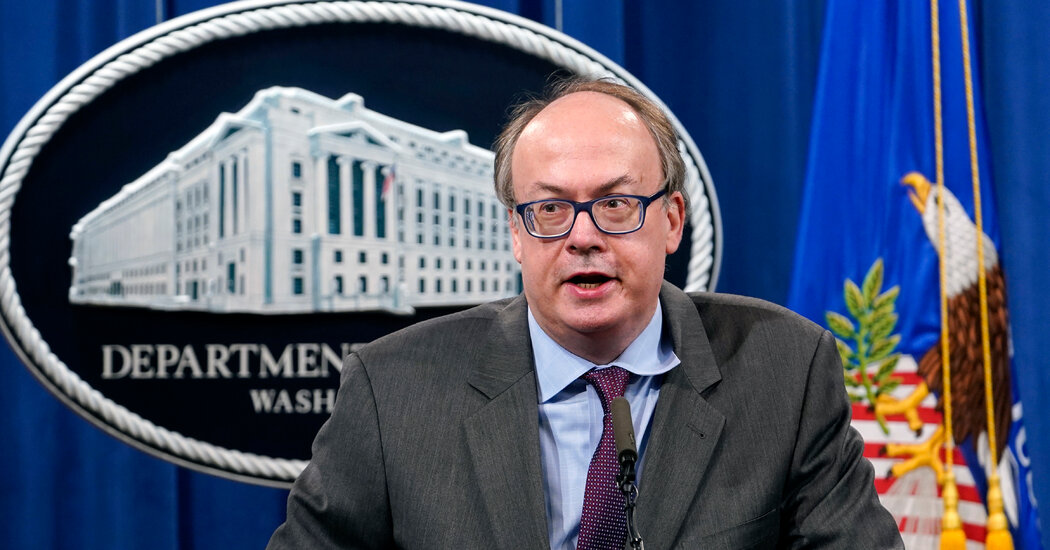
WASHINGTON — Jeffrey Clark, a former Justice Department official involved in former President Donald J. Trump’s frenzied efforts to overturn the 2020 presidential election, refused to cooperate on Friday with the House committee investigating the Jan. 6 Capitol attack, leading to a sharp rebuke from the committee’s chairman.
The standoff between Mr. Clark and the committee is the second such confrontation since Congress began investigating the circumstances surrounding the Capitol violence, seeking information on Mr. Trump’s attempts to subvert the election. The House has already voted to find one Trump ally, Stephen K. Bannon, in criminal contempt of Congress for stonewalling the inquiry.
“Mr. Clark’s complete failure to cooperate today is unacceptable,” said Representative Bennie Thompson, Democrat of Mississippi and the chairman of the committee. “As prescribed by the House rules, I have considered Mr. Clark’s claim of privilege and rejected it. He has a very short time to reconsider and cooperate fully. We need the information that he is withholding, and we are willing to take strong measures to hold him accountable.”
Mr. Clark appeared before the committee on Friday but delivered a letter saying he would not answer substantive questions. He cited attorney-client privilege protecting his conversations with Mr. Trump.
“He is duty-bound not to provide testimony to your committee covering information protected by the former president’s assertion of executive privilege,” Mr. Clark’s lawyer, Harry W. MacDougald, wrote in a letter to the committee, which was reported earlier by Politico. “Mr. Clark cannot answer deposition questions at this time.”
Mr. Bannon also cited Mr. Trump’s directive for former aides and advisers to invoke immunity and refrain from turning over documents that might be protected under executive privilege in his refusal to cooperate. A federal judge expressed skepticism on Thursday about the merits of Mr. Trump’s lawsuit against the committee seeking to block from release at least 770 pages of documents related to the Capitol riot.
Under federal law, any person summoned as a congressional witness who refuses to comply can face a misdemeanor charge that carries a fine of $100 to $100,000 and a jail sentence of one month to one year.
Mr. Thompson suggested such a penalty could await Mr. Clark, once a little-known official who repeatedly pushed his colleagues at the Justice Department to help Mr. Trump undo his loss.
The committee has issued a subpoena seeking testimony and records from Mr. Clark, a focus that indicates it is deepening its scrutiny of the root causes of the attack, which disrupted a congressional session called to count the electoral votes formalizing President Biden’s victory.
Mr. Thompson contrasted Mr. Clark’s refusal to cooperate with the actions of Jeffrey A. Rosen, who was acting attorney general during the Trump administration, and previously sat for a lengthy interview with the committee.
Deconstructing the U.S. Capitol Riot
The Times has been investigating how a pro-Trump mob stormed the Capitol on Jan. 6, 2021, and deconstructing key moments amid the ongoing fallout.
“His refusal to answer questions about the former president’s attempt to use the Department of Justice to overturn the election is in direct contrast to his supervisors at the department,” Mr. Thompson said in a statement. “It’s astounding that someone who so recently held a position of public trust to uphold the Constitution would now hide behind vague claims of privilege by a former president, refuse to answer questions about an attack on our democracy and continue an assault on the rule of law.”
Mr. MacDougald’s letter argued that Mr. Clark had nothing to do with the events of Jan. 6.
“He has informed me he worked from home that day to avoid wrestling with potential street closures to get to and from his office at Main Justice,” the letter said. “Nor did Mr. Clark have any responsibilities to oversee security at the Capitol or have the ability to deploy any Department of Justice personnel or resources there.”
But the Senate Judiciary Committee said in a recent report there was credible evidence that Mr. Clark was involved in other efforts to interrupt the peaceful transfer of power, citing his proposal to deliver a letter to state legislators in Georgia and others encouraging them to delay certification of election results.
The Senate committee also said Mr. Clark recommended holding a news conference announcing that the Justice Department was investigating allegations of voter fraud, in line with Mr. Trump’s repeated demands, despite a lack of evidence of any fraud. Both proposals were rejected by senior leaders in the department.
The New York Times reported in January that Mr. Clark also discussed with Mr. Trump a plan to oust Mr. Rosen, and wield the department’s power to force state lawmakers in Georgia to overturn its presidential election results. Mr. Clark denied the report, which was based on the accounts of four former Trump administration officials who asked not to be named because of fear of retaliation.
Mr. Clark’s subpoena is one of 19 issued by the committee. The panel has interviewed more than 150 witnesses so far, according to a person with knowledge of its activities.



